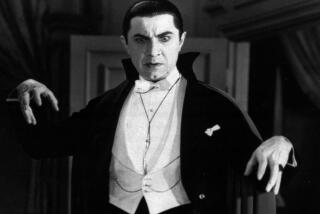Critic’s Notebook: ‘Taste’ and ‘Backyard’ revel in gore and lack style
Last weekend my theatergoing got off to an especially bloody start at the Sacred Fools Theater, where I caught one of the last performances of “Taste,” the world premiere of Benjamin Brand’s play inspired by a real-life tale of cannibalism.
The main event of this two-hander, performed by Donal Thoms-Cappello (an inspired sociopath) and Chris L. McKenna, was the severing and cooking of a penis, which was then shared as a snack between willing victim and culinary assailant before this pathological date climaxed in murder.
I couldn’t imagine that after experiencing this lurid scenario, I would be flinching at another amputation the following night at Echo Theater Company’s world premiere of “Backyard,” Mickey Birnbaum’s drama about backyard wrestling in a trashy suburb of San Diego on the Mexican border. The body part involved here was less private though no less agonizing to see cut off.
When confronted with horrific violence on stage or on screen, I have a tendency to grab whomever I’m sitting beside and angrily mutter, “Why are they doing this to us?” At “Taste,” I left marks on my friend’s body during the prolonged kitchen surgery. At “Backyard,” it was a tolerant editor who felt my fingers digging into his arm when the adolescent girl in the piece sliced off the ear of a teenage boy wrestler and flung the bloody cartilage onto his toppled body.
As an admirer of Jacobean drama, I don’t like to think of myself as the squeamish sort. On numerous occasions I’ve witnessed the gouging out of Gloucester’s eyes in “King Lear” and have even managed to withstand on more than one occasion the elaborate torturing of the Duchess of Malfi in John Webster’s masterpiece.
But something was missing from these contemporary works that Shakespeare and his contemporaries would have considered unthinkable to do without: dramatic poetry.
Brand dramatizes his story with a deft realistic touch. Everything is meticulously arranged as though a banquet were to be served. Onions are caramelized, a selection of razor-sharp knives is laid out.
The cinematic virtue of verisimilitude, in short, replaces a keener aesthetic choice.
I kept wondering what an artist like Harold Pinter would do with this material. I doubt that this depraved act (sensationalized in the international media when the story of the “Rotenburg Cannibal” broke) would have inspired his playwriting, though torture and trauma were subjects that interested him both psychologically and politically.
Plausible re-creation, however, definitely wasn’t his mode. It was through a stylistic attack of language that Pinter would attempt to expansively illuminate the sadistic and masochistic mentalities in collision.
Extreme as the two alienated characters are in “Taste,” their manner of negotiating intimacy follows some universal patterns. But the play, meticulously staged by Stuart Gordon in a gleamingly neat modern apartment, relies too much on the suspense and gore of its macabre action.
The production flamboyantly exposed the hideous gash but discreetly veiled the artistic rationale for turning this tabloid story into drama.
“Backyard” suffers from a more prosaic writing problem: This rambling play is badly in need of an editor. Scenes are inserted to round out the generic story arc in what is otherwise an imaginatively daring piece. It’s as though a rambunctious drama inspired by Sam Shepard has tried to answer the perfunctory plot concerns of a movie studio executive.
Birnbaum uses this culture of backyard wrestling to explore the fantasy lives of a group of teens whose fathers have chronically let them down. The ensuing violence expresses the rage of characters even when it’s of the junior Hulk Hogan variety. But this fiercely acted production under Larry Biederman’s direction isn’t able to concentrate the energy of this sprawling drama, which dissipates its Oedipal meaning.
The theater has been shocking audiences since Clytemnestra hacked Agamemnon to death in Aeschylus’ tragedy. The issue isn’t the number of people slaughtered or the method chosen. It’s about the larger moral vision and the degree of artistic control.
More to Read
The biggest entertainment stories
Get our big stories about Hollywood, film, television, music, arts, culture and more right in your inbox as soon as they publish.
You may occasionally receive promotional content from the Los Angeles Times.











